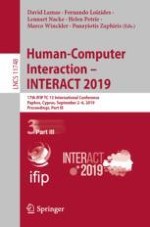2019 | OriginalPaper | Buchkapitel
How Do They Use Their Smartphones: A Study on Smartphone Usage by Indian Students
verfasst von : Subrata Tikadar, Samit Bhattacharya
Erschienen in: Human-Computer Interaction – INTERACT 2019
Aktivieren Sie unsere intelligente Suche, um passende Fachinhalte oder Patente zu finden.
Wählen Sie Textabschnitte aus um mit Künstlicher Intelligenz passenden Patente zu finden. powered by
Markieren Sie Textabschnitte, um KI-gestützt weitere passende Inhalte zu finden. powered by
